I recommend to watch the entire video.
Added: 19. April 2010
The man who trades freedom for security does not deserve nor will he ever receive either. – Benjamin Franklin
I recommend to watch the entire video.
Added: 19. April 2010
Sure! That is called ‘his-story’ (Henry Paulson’s fairy tale).
See also:
– Paulson Says He Was Prepared to Guarantee Lehman (BusinessWeek):
Jan. 29 (Bloomberg) — Former U.S. Treasury Secretary Henry Paulson says in his memoir that he was prepared to support a government backstop to prevent the bankruptcy of Lehman Brothers Holdings Inc. until he learned the firm’s assets were so mis- marked it would have guaranteed a loss to taxpayers.‘
As of ‘now’ the US taxpayer has already lost everything, because of bailouts, stimulus packages, quantitative easing etc., which only benefited the banksters and the elite. It is just that the people don’t know it yet.
The US government and the Fed are bankrupting America!
As a side note:
If you are an investor and your investment starts to look really bad and is about to lose a lot of money, then you better sell it straightaway.
China is also about to lose a lot of money from holding US Treasuries, and it has now become very difficult to sell them without tremendous consequences, but the bailout/stimulus bubble will finally blow up. This will be the end of the dollar and the US as we know it.
Just think about the big dilemma the Chinese are in now, because of the irresponsible economic policies of the US.
I am not saying that China ‘always’ acted responsible. This is a created crisis. This is the Greatest Depression and it has only just begun.
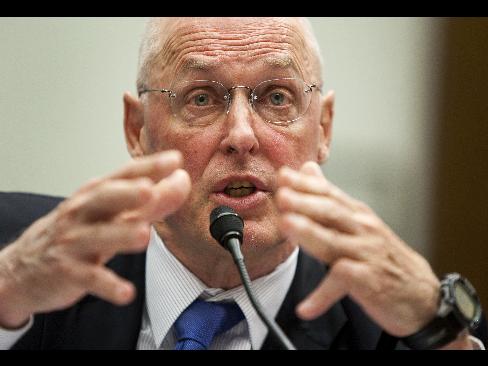
Henry Paulson, former U.S. treasury secretary, testifies at a House Oversight and Government Reform Committee hearing in Washington, D.C., on Jan. 27, 2010. (Bloomberg)
Jan. 29 (Bloomberg) — Russia urged China to dump its Fannie Mae and Freddie Mac bonds in 2008 in a bid to force a bailout of the largest U.S. mortgage-finance companies, former Treasury Secretary Henry Paulson said.
Paulson learned of the “disruptive scheme” while attending the Beijing Summer Olympics, according to his memoir, “On The Brink.”
The Russians made a “top-level approach” to the Chinese “that together they might sell big chunks of their GSE holdings to force the U.S. to use its emergency authorities to prop up these companies,” Paulson said, referring to the acronym for government sponsored entities. The Chinese declined, he said.
Russia’s five-day war with U.S. ally Georgia started on Aug. 8, the same day as the opening ceremonies of the Beijing Games. Prime Minister Vladimir Putin told U.S. President George W. Bush during those ceremonies that “war has started,” according to Dmitry Peskov, Putin’s spokesman.
“The report was deeply troubling — heavy selling could create a sudden loss of confidence in the GSEs and shake the capital markets,” Paulson wrote. “I waited till I was back home and in a secure environment to inform the president.”
Russia never approached China about dumping U.S. bonds, Peskov said today. “This is not the case,” he said by phone.
Russia sold all of its Fannie and Freddie debt in 2008, after holding $65.6 billion of the notes at the start of that year, according to central bank data. Fannie and Freddie were seized by regulators on Sept. 6, 2008, amid the worst U.S. housing slump since the Great Depression.
– Iran to drop US dollar from forex reserves
BEIJING, October 14 (RIA Novosti) – Russia is ready to consider using the Russian and Chinese national currencies instead of the dollar in bilateral oil and gas dealings, Prime Minister Vladimir Putin said on Wednesday.
The premier, currently on a visit to Beijing, said a final decision on the issue can only be made after a thorough expert analysis.
“Yesterday, energy companies, in particular Gazprom, raised the question of using the national currency. We are ready to examine the possibility of selling energy resources for rubles, but our Chinese partners need rubles for that. We are also ready to sell for yuans,” Putin said.
He stressed that “there should be a balance here.”
On Tuesday, Russia and China agreed terms for Russian gas deliveries at a level of up to 70 billion cubic meters a year. China also imports oil from Russia.
The Russian prime minister said the issue would be addressed among others at a meeting of Shanghai Cooperation Organization (SCO) finance ministers, who are to convene before the end of the year in Kazakhstan.
Britain’s Independent newspaper reported last Tuesday that Russian officials had held “secret meetings” with Arab states, China and France on ending the use of the U.S. dollar in international oil trade.
Read moreRussia ready to abandon US dollar in oil, gas trade with China
SOCHI, Russia — Russia’s Prime Minister Vladimir Putin on Friday said other currencies besides the dollar should be used as global reserves to reduce the risks posed by swelling U.S. debt.
Putin, who spoke at an international investment forum in the Black Sea resort of Sochi, chided the United States for “an uncontrolled issue of dollars” and said the American currency’s dominance had been “one of the triggers” of the global crisis.
Putin renewed Russia’s call on the U.S. administration and global community to give the green light to alternative reserve currencies: “If there are several reserve currencies, this will not harm the U.S. economy in any way.”
President Dmitry Medvedev’s economic advisor, Arkady Dvorkovich, said Thursday that Russia would at next week’s G20 summit in Pittsburgh press for more follow-through on measures to confront the global downturn and to change Western-dominated international financial institutions.
Russia and China have pushed for alternative reserve currencies, but being the world’s largest holders of U.S. dollar assets – such as Treasuries – they are unlikely to abandon it. Dvorkovich stressed on Thursday that Russia is not out to replace the dollar, but only diversify.
Putin, meanwhile, also promised to encourage foreign investment in Russia by removing bureaucratic hurdles.
Read morePutin says US dollar issuance ‘uncontrolled’, calls for diversified reserves
– Deputy PM: Time is now for action on Iran nukes (Haaretz):
Deputy Prime Minister Dan Meridor said “the time is now” for Israel and the world to act to thwart Iran’s nuclear ambitions, after world powers on Friday accepted Iran’s response to their offer of talks on the issue.
“The time is now,” Meridor told Reuters in an interview published Saturday. “There is no more time to waste, and that’s not only the Israeli perspective, it’s much more general.”
Meridor, who is also Minister of Intelligence and Atomic Energy, played down speculation that Israel was on the verge of launching a military strike against Iran’s nuclear facilities.
– Germany: BND denies report on Iran bomb timing; Iran not be able to produce an atomic bomb for years (Reuters):
But a BND spokesman said the article did not reflect the view of the agency, which is that Iran would not be able to produce an atomic bomb for years.
“We are talking about several years not several months,” the spokesman said.

Strikes on Iran would lead to an increase in terrorism, Vladimir Putin says (Reuters: Christian Hartmann)
Russian Prime Minister Vladimir Putin has warned against military action targeting Iran or imposing new sanctions to curb its nuclear program.
Iran’s latest proposals on its nuclear ambitions have brought diverging views from the US and Russia.
Iran has offered to hold “comprehensive, all-encompassing and constructive” negotiations on a range of security issues, including global nuclear disarmament.
Related Story: ‘Forged US intelligence’ behind Iran nuclear claims (ABC News)
While Russia’s foreign minister has described them as a positive step forward, Washington is unhappy with the proposals.
Both US and Israel have never ruled out the option of air strikes on Iran to stop it acquiring an atomic weapon.
Speaking in Moscow, Mr Putin said strikes on Iran would lead to an increase in terrorism in the region.
“This would be very dangerous, unacceptable. This would lead to an explosion of terrorism, increase the influence of extremists,” he said when asked about the possibility of an attack.
“I doubt very much that such strikes would achieve their stated goal.”
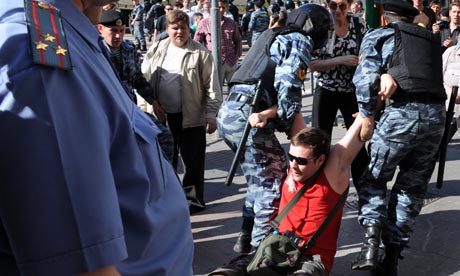
Russian police detaining a demonstrator at an unauthorised protest against Prime Minister Vladimir Putin in Moscow. Photograph: ALEXANDER NEMENOV/AFP/Getty Images
Russia’s prime minister, Vladimir Putin, is facing the most sustained and serious grassroots protests against his leadership for almost a decade, with demonstrations that began in the far east now spreading rapidly across provincial Russia.
Read moreProtests against Putin sweep Russia as economy goes bust
MOSCOW — If you’re inclined to believe Igor Panarin, and the Kremlin wouldn’t mind if you did, then President Barack Obama will order martial law this year, the U.S. will split into six rump-states before 2011, and Russia and China will become the backbones of a new world order.
Panarin might be easy to ignore but for the fact that he is a dean at the Foreign Ministry’s school for future diplomats and a regular on Russia’s state-guided TV channels. And his predictions fit into the anti-American story line of the Kremlin leadership.
“There is a high probability that the collapse of the United States will occur by 2010,” Panarin told dozens of students, professors and diplomats Tuesday at the Diplomatic Academy — a lecture the ministry pointedly invited The Associated Press and other foreign media to attend.
The prediction from Panarin, a former spokesman for Russia’s Federal Space Agency and reportedly an ex-KGB analyst, meshes with the negative view of the U.S. that has been flowing from the Kremlin in recent years, in particular from Vladimir Putin.
Putin, the former president who is now prime minister, has likened the United States to Nazi Germany’s Third Reich and blames Washington for the global financial crisis that has pounded the Russian economy.
Thousands protest at Putin’s handling of economy while rift with Medvedev grows
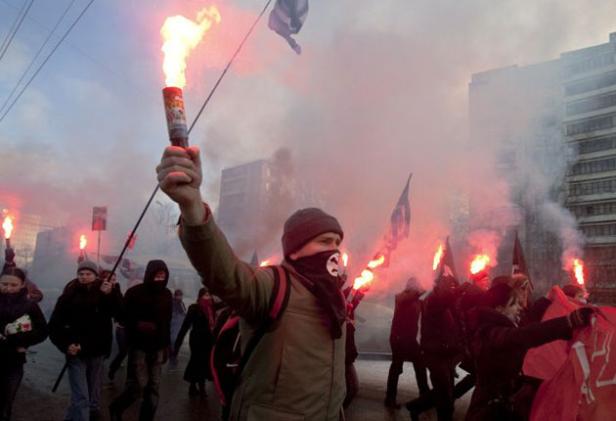
Supporters of the banned National Bolshevik party protest against Moscow’s rulers
The Kremlin’s rule is beginning to look much shakier than at any time since Vladimir Putin came to power, after a series of protests in cities across its vast landmass this weekend by Russians disgruntled about the economy. And as the country starts to feel the effects of the global credit crunch, there are also signs of a growing rift between Prime Minister Putin, and his hand-picked successor as President, Dmitry Medvedev.
In Vladivostok, 2,000 protesters took to the streets, with some carrying banners reading “Kremlin, we are against you”, and other people chanting directly for the removal of Mr Putin. The Pacific port city, seven time zones away from Moscow, has become a focal point for dissent after riot police broke up a march last year over car imports and detained 100 people. Saturday’s demonstration, under the watchful eye of the police, passed off peacefully.
Nearly every major city had a street rally, and though most were low key, the unusual scale of dissatisfaction is likely to worry the authorities. The Russian economy has been hit hard by falling oil prices, many oligarchs have seen billions of pounds wiped off the value of their shares, and ordinary Russians are feeling the pinch as factories struggle to stay afloat and companies lay off employees.
In Moscow, a motley band of communists, anarchists and liberals gathered at several points across the city to protest against Kremlin rule. At one spot, a dozen protesters taped over their mouths with white tape, held up white placards with no slogans, and handed blank white flyers to passers-by. Bemused by such a conceptual approach to protest, the police rounded them up and arrested them anyway, and the organiser got five days in prison.
Read moreDissent beginning to spread across Russia as crisis bites

For a few dollars less: Vladimir Putin has called for the end of the dollar as the world’s reserve currency. Photo: ASSOCIATED PRESS
“The one reserve currency has become a danger to the world economy: that is now obvious to everybody,” he said in a speech at the World Economic Forum.
It is the first time that a Russian leader has set foot in the sanctum sanctorum of global capitalism at Davos.
Mr Putin said the leading powers should ensure an “irreversible” move towards a system of multiple reserve currencies, questioning the “reliability” of the US dollar as a safe store of value. “The pride of Wall Street investment banks don’t exist any more,” he said.
For all his bluster, Mr Putin’s bargaining power is weakening by the day. Russia’s foreign reserves have fallen by 34pc since August to $396bn (£277bn) after months of capital flight and the collapse in the price of Urals crude oil to $45 a barrel. The rouble also fell to a record low yesterday after sliding for weeks in a controlled devaluation.
Mr Putin said: “We are witnessing a truly global crisis. The speed of developments beats every record, and the strategic difference from the Great Depression is that under globalisation this touches everyone. This has multiplied the destructive force. It looks exactly like the perfect storm.”
Read moreRussian prime minister Vladimir Putin calls for end of dollar stranglehold
Vladimir Putin, Russia’s prime minister, yesterday ordered Gazprom, the Russian energy giant, to reduce gas supplies to Ukraine bound for Europe in a move that escalates the dispute between the two countries, writes Isabel Gorst in Moscow .
Gazprom claims Kiev has been stealing gas from transit pipelines since it cut off supplies to Ukraine on January 1 after talks about a new gas deal collapsed.
Mr Putin ordered Alexei Miller, chief executive of Gazprom, to cut supplies to the Ukrainian transit system by the same volume as Ukraine had taken.
Naftogaz, Ukraine’s state gas company, said it had been notified by Gazprom that it would cut transit supplies to Europe by 65.3m cubic metres a day to 221.8m cubic metres per day. “Gazprom has in fact cut volumes of transit gas to European customers,” Naftogaz said.
Dec. 29 (Bloomberg) — The ruble fell to a record low against the euro as Russia devalued the currency for the 12th time in seven weeks after the government forecast its first budget deficit in a decade.
The managed currency weakened 2.6 percent to 41.7245 per euro, the lowest since the European currency started trading in 1999. It fell 0.7 percent to 29.1797 versus the dollar, a four- year low. Bank Rossii allowed the ruble to fall 1.7 percent against its basket of 55 percent dollars and 45 percent euros, the most since the measure was introduced in February 2005, according to a central bank official who declined to be identified, citing bank policy.
Read moreRuble Falls to Record Low Versus Euro as Russia Weakens Defense
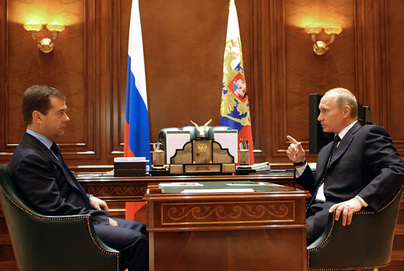
RIA NOVOSTI/REUTERS Russia’s Prime Minister Vladimir Putin, right, speaks with President Dmitry Medvedev in the Gorki residence outside of Moscow. (Dec. 17, 2008)
MOSCOW-The upper house of parliament unanimously approved extending Russian presidential terms on Monday, a constitutional amendment which has fuelled speculation Vladimir Putin will return as head of state.
The Federation Council endorsed a decision by regional assemblies to support a six-year term for future presidents versus four years now. President Dmitry Medvedev, who proposed the changes, now will sign the bill into law.

Vladimir Putin talks to Roman Abramovich, whose business interests are reported to have already received a £1.2bn bailout
They bought country houses, super-yachts and football clubs, but the era of the Russian oligarch may be drawing to a close.
Details of the financial bailout being offered by the Kremlin to Russia’s richest men have revealed that many could be stripped of power by next Christmas. The loans will last for one year only and will be collateralised against shares owned by the oligarchs.
Most are expected to struggle to repay the loans within a year, raising the possibility that the Kremlin is trying to engineer the renationalisation of the Russian economy.
The bailout could be a double-edged sword: it may save the oligarchs’ companies in the short-term but could reduce their power and wealth in the long run. According to Zina Psiola, a Russian fund manager at Clariden Leu in Zurich: “Some oligarchs will no longer be oligarchs. It’s extremely unlikely they’ll all be able to repay in a year.”
Figures such as Roman Abramovich, the owner of Chelsea Football Club, have seen the value of their companies collapse, forcing them to seek government aid or risk defaulting on loans to foreign banks. Evraz, a steel company part-owned by Mr Abramovich, has reportedly already received $1.8 billion (£1.2 billion) from the Kremlin.
Read moreOligarchs go cap in hand to the Kremlin as their vast empires begin to crumble
From the article:
“Mr Saakashvili admitted yesterday that Georgia began military operations in South Ossestia but insisted that it was in response to Russian provocation.”
Related info:
– Vladimir Putin ‘wanted to hang Georgian President Saakashvili by the balls’.
Source: The Times
She styles her hair like Margaret Thatcher and counts the Iron Lady among her political idols. Now the female face of Georgia’s pro-Western Rose Revolution is challenging her former ally Mikhail Saakashvili.
Nino Burjanadze is emerging as the key threat to President Saakashvili over the disastrous handling of the war for South Ossetia. Protest was muted while the Russian Army occupied Georgia but its withdrawal is stirring opposition demands for him to go.
Read moreSaakashvili admitted that Georgia began military operations in South Ossestia
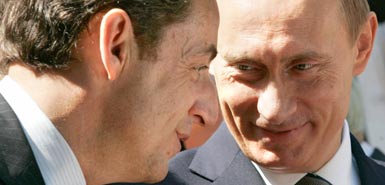
(Dmitry Astahov/AFP/Getty Images)
Vladimir Putin reportedly wanted to hang President Saakashvili “like the Americans hanged Saddam”
Nicolas Sarkozy saved the President of Georgia from being hanged “by the balls” – a threat made last summer by Vladimir Putin, according to an account that emerged yesterday from the Élysée Palace.
The Russian Prime Minister had revealed his plans for disposing of Mr Saakashvili when Mr Sarkozy was in Moscow in August to broker a ceasefire in Georgia.
Jean-David Levitte, Mr Sarkozy’s chief diplomatic adviser, reported the exchange in a news magazine before an EU-Russia summit today. The meeting will be chaired by the French leader and President Medvedev.
With Russian tanks only 30 miles from Tbilisi on August 12, Mr Sarkozy told Mr Putin that the world would not accept the overthrow of Georgia’s Government. According to Mr Levitte, the Russian seemed unconcerned by international reaction. “I am going to hang Saakashvili by the balls,” Mr Putin declared.
Mr Sarkozy thought he had misheard. “Hang him?” – he asked. “Why not?” Mr Putin replied. “The Americans hanged Saddam Hussein.”
Mr Sarkozy, using the familiar tu, tried to reason with him: “Yes but do you want to end up like [President] Bush?” Mr Putin was briefly lost for words, then said: “Ah – you have scored a point there.”
Mr Saakashvili, who was in Paris to meet Mr Sarkozy yesterday, laughed nervously when a French radio station read him the exchange. “I knew about this scene, but not all the details. It’s funny, all the same,” he said.
Read moreVladimir Putin ‘wanted to hang Georgian President Saakashvili by the balls’
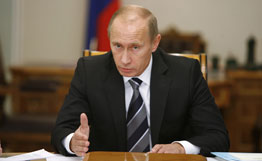
MOSCOW, October 28 (RIA Novosti) – Russian Prime Minister Vladimir Putin proposed on Tuesday that Russia and China gradually switch over to national currency payments in bilateral trade, expected to total $50 billion in 2008.
“We should consider improving the payment system for bilateral trade, including by gradually adopting a broader use of national currencies,” Putin told a bilateral economic forum.
He admitted the task would be tough, but said it was necessary amid the current problems with the dollar-based global economy.
Read morePM Putin suggests Russia, China ditch dollar in trade deals
Russian shoppers have been served an uncomfortable reminder of the Soviet era after finding shelves in some Moscow supermarkets empty, a further sign that the woes of the financial markets have begun to affect the mainstream economy.
For a generation of Russians who queued daily in the snow for the most basic of staples, the symbolism of a bare supermarket shelf is so powerful that it could potentially destroy the reputation of Vladimir Putin, the prime minister, as saviour of the world’s largest country.
The shortages are not yet widespread. Even so, goods have begun to vanish from dozens of Moscow supermarkets over the past fortnight.
At a branch of the supermarket chain Samokhval in southwestern Moscow, a handful of shoppers pushed their trolleys through empty rows of shelves that once groaned under the weight of imported wares.
The deep freezes hummed, although there was nothing to freeze. Only a row of baked beans, a few jars of olives and sealed cupboards filled with vodka and cheap wine interrupted the void.
Read moreFinancial crisis: Moscow supermarket shelves increasingly empty in Soviet era reminder
Dmitry Medvedev, the Russian president, yesterday vowed to defy Western attempts to isolate Moscow as he gave his backing to an ambitious re-armament programme.
Both Mr Medvedev and Vladimir Putin, the prime minister, resorted to the language of the Cold War as they pledged to increase defence spending by 50 per cent over the next three years.
But they also sought to portray Russia as the victim of Nato aggression.
As his parliament gave its support to the higher defence budget, Mr Medvedev accused the United States and its allies of seeking to isolate Russia behind “thick walls and an iron curtain.”
President Dmitry Medvedev said that Russia should unilaterally claim part of the Arctic, stepping up the race for the disputed energy-rich region.
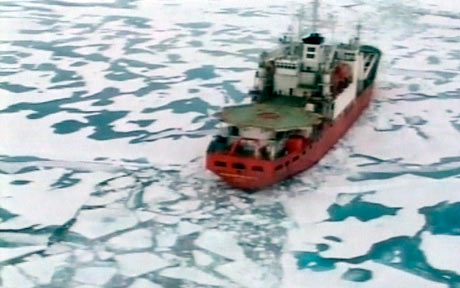
The expedition to plant a Russian flag on the seabed beneath the ice of the North Pole last August Photo: REUTERS
“We must finalise and adopt a federal law on the southern border of Russia’s Arctic zone,” Mr Medvedev told a meeting of the Security Council, in remarks carried by Interfax news agency.
“This is our responsibility, and simply our direct duty, to our descendents,” he said. “We must surely, and for the long-term future, secure Russia’s interests in the Arctic.”
“The Russians are right! We’re wrong! Georgia started it, the Russians ended it,” Rep. Dana Rohrbacher, a California Republican, told Assistant Secretary of State Dan Fried, who testified on administration policy to both the Senate panel and the House Foreign Affairs Committee.
_________________________________________________________________________________
WASHINGTON, Sept 9 (Reuters) – The United States said on Tuesday it would examine how to help rebuild Georgia’s military after Tbilisi’s devastating war with Russia, risking renewed Russian wrath over military aid to the small U.S. ally.
But some lawmakers berated the Bush administration for its pro-Georgia policy, saying the Russian-Georgian war had highlighted U.S. weakness and harmed ties with Moscow — and they questioned the cost of the U.S. committment to Tbilisi.
MOSCOW – Russia said Monday it will send a naval squadron and long-range patrol planes to Venezuela this year for a joint military exercise in the Caribbean, an announcement made at a time of increasingly tense relations with the United States.
The apparently retaliatory move follows the U.S. deployment of warships to deliver aid to the former Soviet nation of Georgia, barely a month after Russian armor and aircraft crushed the Georgian military in a five-day war.
The US military provided combat training to 80 Georgian special forces commandos only months prior to Georgia’s army assault in South Ossetia in August.
The revelation, based on recruitment documents and interviews with US military trainers obtained by the Financial Times, could add fuel to accusations by Vladimir Putin, Russian prime minister, last month that the US had “orchestrated” the war in the Georgian enclave.
The training was provided by senior US soldiers and two military contractors. There is no evidence that the contractors or the Pentagon, which hired them, knew that the commandos they were training were likely be used in the assault on South Ossetia.
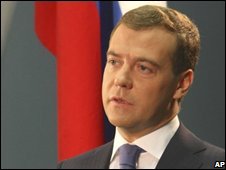
(BBC NEWS) Russian President Dmitry Medvedev has described his Georgian counterpart as a “political corpse”, saying Moscow does not recognise him as president.
“President Saakashvili no longer exists in our eyes. He is a political corpse,” he told Italy’s Rai television.
He said US support for Mr Saakashvili had helped provoke the crisis, which has seen Russian troops invade Georgia.
He said Russia did not fear isolation by Western countries that have condemned the Russian intervention.
Fighting between Russia and Georgia began on 7 August after the Georgian military tried to retake the breakaway region of South Ossetia by force.
Russian forces launched a counter-attack and the conflict ended with the ejection of Georgian troops from both South Ossetia and Abkhazia.
Russia has since recognised the independence of both regions, though no other country has.